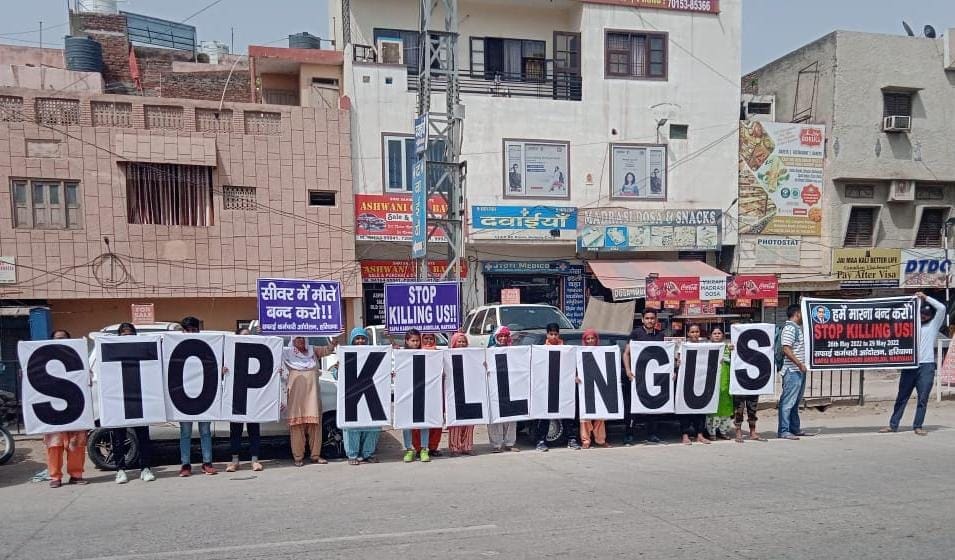
One person dies every five days cleaning sewers and septic tanks in India
Even when the relentless ‘Action 2022’ campaign against sewer and septic tank deaths across India continues beyond 50 days, it received little attention from the general public.
With India celebrating 75 years of independence, Safai Karamchan Andolan(SKA), a movement to eradicate manual scavenging in the country, has launched a 75-day campaign to stop the regular death in sewers and septic tanks, called “Stop Killing Us.”
On 11 May 2022, Bezwada Wilson, national convenor of SKA and Ramon Magsaysay awardee, announced a nationwide awareness campaign calling for protests across India where workers demand due recognition and compensation for deaths in sewers.
The campaign was launched at Karol Bagh, Delhi and since has branched to different cities across the country.
In spite of the blazing sun and driving downpours, sanitation workers and activists gathered, holding up placards that read “STOP KILLING US” in large block letters.
Despite the protests held in more than ten states and similar events to be organised in the rest of the states, there is not even a shed of a response from any quarter or centres of power.
As per the Socio-Economic Caste Census (SECC) 2011, rural Maharashtra alone has 65,181 households where at least one person is employed as a manual scavenger, the highest in the country, accounting for 35 per cent of the total 1.82 lakh such households in rural India.
Existing statistics can be reductive as no numbers of those employed in sewer and septic tank cleaning are readily available. All attempts to compile data have been limited to accounting for those removing human excreta from dry latrines, open drains, and single pit toilets in villages. The more dangerous forms with the often fatal risk of entering toxic sewerage systems, mainly in urban areas, have not been documented officially. This remains, evading the fact that the 1993 law outlawing manual scavenging in India was amended in 2013 to include sewer and septic tank cleaning.
According to numbers collated by the National Commission for Safai Karamcharis (NCSK), the statutory body that was set up by an Act of Parliament for the welfare of sanitation workers, since 1 January 2017, one person has died every five days, on an average, while cleaning sewers and septic tanks across the country.
As the state preferably denies the existence of manual scavenging as a practice banned under the law, in many cases, the families of the dead don’t even get compensation, and the culprits never get punished.
Sudhir Raj, SKA coordinator from Kerala, confirmed this to Maktoob: “Many local representatives were hesitant to admit the presence of sewage workers in their area. When we approached them to collect data for the survey run by NCSK in collaboration with SKA and Sujith Mission, they insisted that no one undertook manual scavenging because it was against the law.”
“We want these killings to end; that is why the slogan”, said Bezwada Wilson to Maktoob.
“Sewers are fast becoming death pits! 14 Indian citizens have died inside sewers in the last three days in four states!”, he tweeted on 30 March 2022, and accused the government and administrative bodies of their “criminal silence.”
In another tweet, he asked, “Why nobody mourns the deaths in sewer and septic tanks caused by an insensitive system”, and pointed to the “deafening silence” everywhere. Even the celebrated Swachh Bharat Abhiyan has only tried to address the issue of access to toilets but ignored those cleaning them thoroughly.
A British court fined a Leicestershire-based company called Greenfeeds Ltd $2.4 million and jailed its co-owners after two employees drowned in a tanker full of semi-liquid pig feed while cleaning it. Ironically, the world’s largest democracy acts recklessly ignorant of its constitutional obligation to safeguard the right to life of every person.
The campaign demands complete mechanisation of sewage cleaning to eliminate the practice of getting people to clean it manually and urges the Union government to establish an institute for research and analysis on new technology and modernisation of septic tanks and sewer systems.
Further, they call on the government to provide skill training to sanitation workers and offer them dignified occupations.
On the other hand, the campaign is an outcry to the public, people endowed with caste, economic and cultural privilege, to share some moral responsibility in making India manual scavenging free.
Manual Scavenging Act 2013 notes, “It is necessary to correct the historical injustice and indignity suffered by the manual scavengers, and to rehabilitate them to a life of dignity.”
Wilson, in his tweet dated 1 July 2022, noted, “while loyalties to ideas are bought and sold so rampantly these days, our commitment to end caste-based atrocities remains unbridled.”
The root cause for sanitation workers continuing to suffer even in this twenty-first century is society’s inherent casteism and its conscious or unconscious acceptance that sanitation workers are only suited for such menial jobs. Caste-based recruitment is still practised in the modern contract-based manual scavenging industry.
SKA had organised an event of the same name in Jantar Mantar in 2018.
Addressing the crowd, Benzwada Wilson said, “we shouldn’t have to share these stories or relive them. We don’t owe it to anyone. What we deserve is dignity and self-respect, like B.R. Ambedkar had said – and that is what we are fighting for,” as reported by The Wire.



